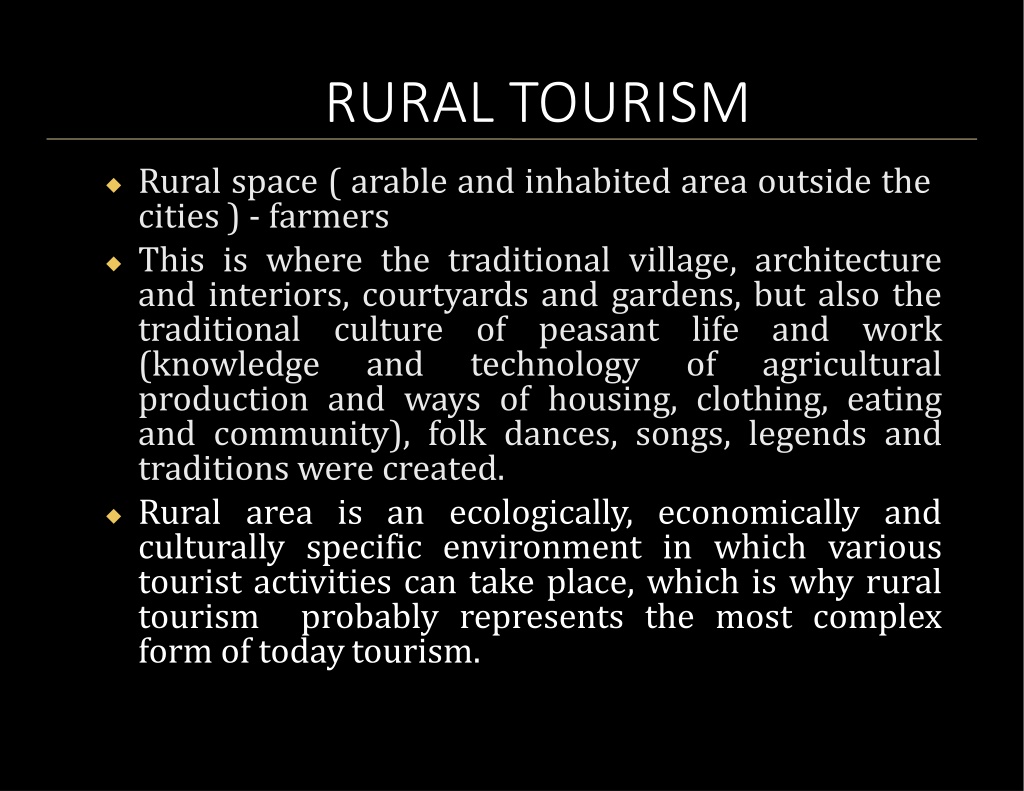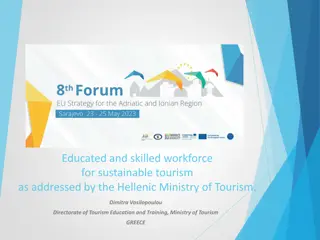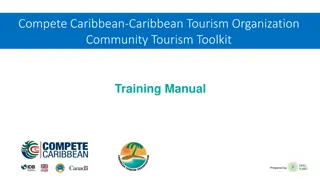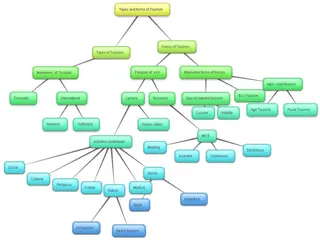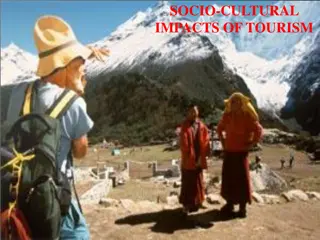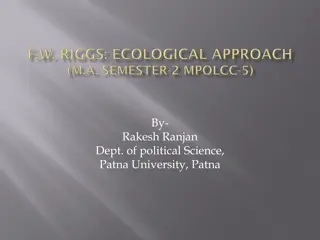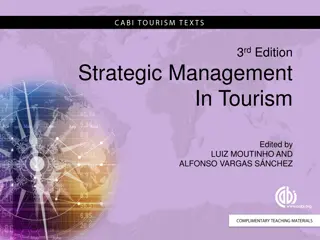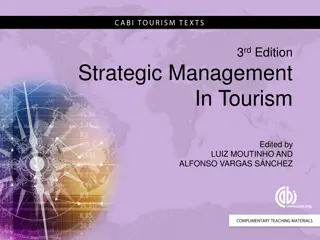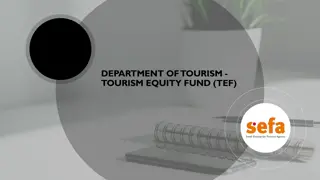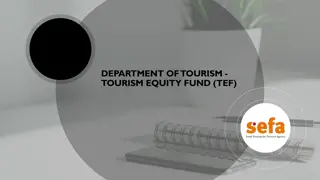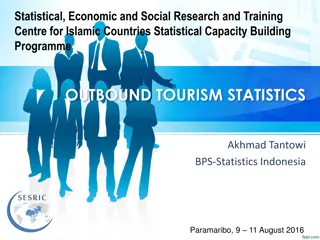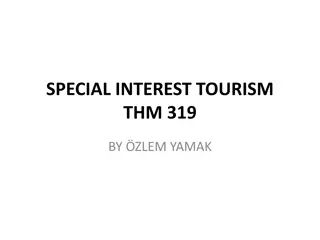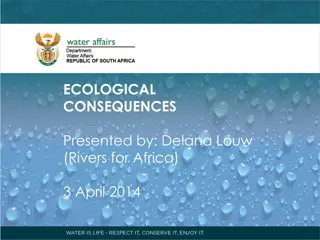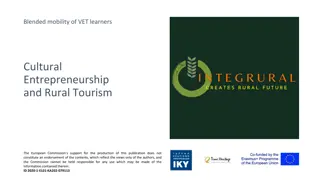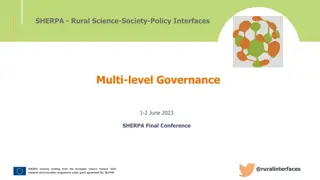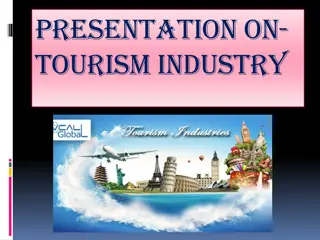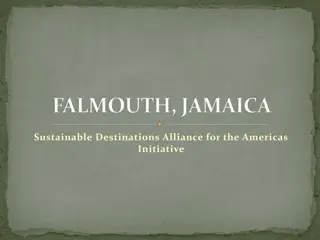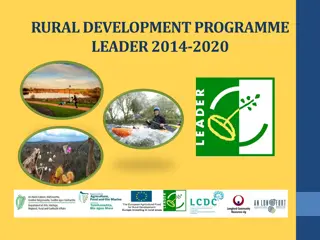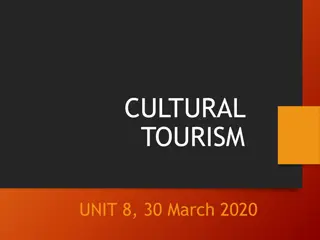Understanding Rural Tourism: A Cultural and Ecological Exploration
Rural tourism encompasses the exploration of arable and inhabited areas outside cities, offering a glimpse into traditional village life, architecture, cultural practices, and agricultural activities. This form of tourism has a rich history in Europe and provides visitors with opportunities to engage in local traditions and experience the unique lifestyle of rural communities.
Download Presentation

Please find below an Image/Link to download the presentation.
The content on the website is provided AS IS for your information and personal use only. It may not be sold, licensed, or shared on other websites without obtaining consent from the author. Download presentation by click this link. If you encounter any issues during the download, it is possible that the publisher has removed the file from their server.
E N D
Presentation Transcript
RURAL TOURISM Rural space ( arable and inhabited area outside the cities ) - farmers This is where the traditional village, architecture and interiors, courtyards and gardens, but also the traditional culture of peasant (knowledge and technology production and ways of housing, clothing, eating and community), folk dances, songs, legends and traditions were created. Rural area is an ecologically, economically and culturally specific environment in which various tourist activities can take place, which is why rural tourism probably represents the most complex form of todaytourism. life and work of agricultural
This form of tourism has its own tradition: it has been popular in Europe since the end of the 18th century, when individuals inspired by romanticism searched for an idyllic village as their owna 'refuge'. However, only at the end of the 20th century, due to city living conditions (noise, crowd, stress) becomes a form of tourism in the rightmeaning.
Tourists are usually most attracted to rural areas where agriculture is a popular activity and which are sparsely populated, isolated. Provide tourist with the opportunity to participate in the activities, traditions and lifestyle of the local population. The term rural tourism is most often used when rural culture is a key component of the tourist product.
Term and definition There is a problem of defining the term rural, which is otherwise important for the purposes of planning and non-urban development policyareas. rural area can have a different degree of 'rural', which shows the so-called Index rurality :
Rural areas are classified as follows: Economically integrated areas (near cities, rural appearance, economically and culturally close to urban areas), "Medium" areas (rural hinterland, predominantly agriculture and forestry, further from cities), Outlying areas (sparsely populated, far from urban areas with poorer landquality). Almost 90% of the EU covers rural areas, which are important not only for the local population, but also as potential for development tourism.
Rural tourism is usually defined by three aspects: Geographical-demographic (characteristics of locations), The 'product' aspect (emphasis on attractions and activities in ruraltourism), Aspect of the tourist experience (picnic, stay in a village household, participation in village activities , etc.).
Smith et al. (2010) give the following definition of rural tourism: 'Rural tourism describes forms of tourist activities that take place in rural areas and that include local culture, tradition and economic activities , as well as outdoor activities and experiences that are realized in an undisturbed rural environment. The local community plays an important role in the rural tourist product'. As a market niche, rural tourism obviously 'covers' a number of narrower niches such as - ecotourism , nature tourism, agritourism, sports and adventure tourism, gastronomic and wine tourism etc.
Types and products of ruraltourism According to Popescu (2008), the rural tourism product consists of four main partssegments: Agrotourism or rural tourism. Activities in nature (cycling, hunting, fishing, hiking , etc.) and culturaltourism, ecotourism, Other combined forms of rural tourism (events, festivals, carnivals, sale of local souvenirs and agricultural products and fig.). The mentioned author, by the way, distinguishes agrotourism and tourism in rural households. In the first case, the service provider is the agricultural producers, and in the second case, the ownershouseholds.
In agrotourism, the key component of the tourist product is rural culture (way of life and business). term farm tourism is also often used. For the development of this type of tourism, the help of the public sector and various institutions is needed. The problem of the rural household's tourism business is that the investments are slow to return, and the 'hosts' usually lack experience and the necessary skills.
Receptive offer in rural tourism The offer is increasingly diversified in terms of species it 's funny and the choice of possible activities (of the program). Receptive (accommodation) facilitiesare: rural touristhousehold, rooms, apartments and houses for rental, guesthouses, hotels, especially small family ones hotels, camps, hunting, fishing and mountain lodges and similar to. These facilities can offer a very different level of comfort, from simple to luxurious. In France, the so- called g tes, outbuildings on farms converted into houses for tourists.
